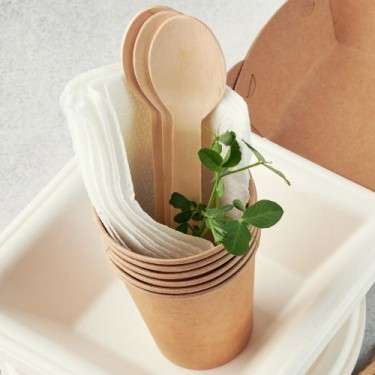How Do Cutlery Pouches Manufacturers Keep Sustainability in Focus
- By: Admin

Even amidst the turmoil of time, businesses in most quarters are under pressure to adopt sustainable practices, and so is packaging. Among the quiet revolutionaries leading this green movement are Cutlery Pouches Manufacturers allied with food related packaging solutions. These products include oft forgotten cutlery pouches that pack a punch in the green story. But just how truly sustainable is the process of manufacturing cutlery pouches? Let's look at how changing practices have turned these manufacturers into giant players in fostering a greener tomorrow.
Rethinking Materials From Plastics to Plant Based
Not just in terms of sustainable design, some of the most tremendous changes have come about regarding the materials: moving away from mere plastics. Manufacturers have, therefore, relied upon compostable and biodegradable materials, for example, kraft paper, bagasse, namely, sugarcane fiber, and cornstarch based PLA. This is the same strength and utility but without the liability of long term environmental damage associated with petroleum based products. During these processes, thereby also minimizing the carbon footprints from these products, these manufacturers could be said to have contributed to trying to eliminate the global menace posed by single use plastics.
Innovative Disposable Solutions
Sustainability is not only concerned with the material used, but design for the product's end of life adds a unique significance. In the case of disposable cutlery pouches, a product almost exclusively designed for single use and disposal, these factors gain special importance. Alternatives are being developed by Disposable Cutlery Pouches Manufacturers like Tag Ingredients India Pvt. Ltd. that biodegrade in a composting environment within a matter of weeks, thus sparing the region the burden of establishing intricate recycling infrastructure. The ink and adhesives used for these pouches are kept to a minimum in order to ensure that breakdown occurs without any harmful residues. In addition, some suppliers have seed embedded pouches so that they may indeed sprout new life upon being planted after utilitarian use.
Sustainable Production Processes
Eco conscious manufacturers are restructuring their production systems. Every step is considered, from employing solar powered machines and water saving applications to reducing waste in the process. Lean manufacturing concepts aimed at lessening cost is fast evolving to suit the goal of reducing ecological impact. Digital printing minimizes chemical waste and conserves resources when compared to the traditional screen printing process.
Widening the Sustainability Spectrum: Ice Cream Sticks
The sustainability impetus, however, is not restricted to pouch making. It goes a step further toward auxiliary items like ice cream sticks. The lowly wooden stick has increasingly become a symbol of really responsibly sourced birchwood or bamboo. The Ice Cream Sticks Manufacturers are trying to ensure that the stick is biodegradable and considered to be coming from sustainably certified forests. Water based coatings and inks harmless to the food are replacing their nasty chemical counterparts, boosting their green credentials.
Packaging with Purpose
Beyond the products, they are reinventing packaging as a mechanism for environmental storytelling. One example is the printing on the product wrapper of the education content directly related to sustainability; others include but go beyond composting used items with customers. Many manufacturers also partner directly with restaurants and hospitality groups to establish take back programs or compost partnerships, thus simplifying the disposal of the items by the end users.
Final Thoughts: Greener Paths Ahead
Manufacturers of disposables, especially with respect to foods, are not visible, yet perform important tasks worthwhile for their products. They better the environment by making wise material choices, reducing waste through manufacture processes, creating innovation in products from disposable pouches to ice cream sticks, saying that anything, however small, is capable of creating a difference in our planet. It's already too obvious that sustainability succeeds through the eyes of consumers, not optional anymore but competitive advantage to most companies. And for those committed manufacturers, the future is brighter and greener.
 +91-9643344440
+91-9643344440


bpdk.png)